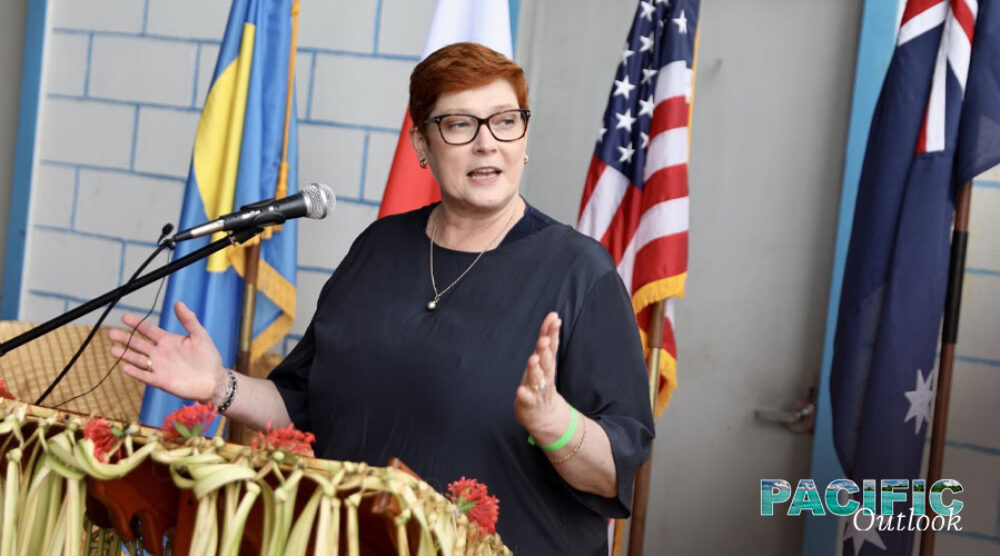ISABELLA BROWN AND TESS NEWTON CAIN |
The “Compact States” are those countries that are in free association with the United States of America: Republic of the Marshall Islands, the Federated States of Micronesia, and Palau. These countries have not been hugely significant in terms of Australian engagement in the Pacific islands region until quite recently. Since the “Pacific Step Up” was initiated in 2016, these countries have received much more attention from Canberra than had previously been the case.
Australian diplomatic representation to the Compact States is an important area of focus to the Pacific Step-up which includes an expansion of Australia’s diplomatic footprint. Since 2016, there have been a total of seven ministerial visits from the Foreign Minister and the Minister for the Pacific and International Development. The most recent visit was in December of 2021 when Marise Payne visited Palau to officially open the Australian embassy in Koror which was established in 2019. This new embassy ensured that Australia had an embassy located in all three compact states.

The Pacific Islands Forum (PIF) is another forum where Australia engages with these states. The annual leaders’ meeting provides a platform for leadership- discussion of key regional issues. However, there could be a potential end to this engagement avenue if the “Micronesian 5” go ahead with their intended withdrawal.
Australia has been the largest aid donor to the Pacific region since 2009. However, the Compact States receive significantly less aid from Australia compared to other Pacific island nations. For example, according to the Lowly Institute Pacific Aid Map in 2019 the Compact States only received USD $10.79 million altogether in aid from Australia. Nonetheless, Australia’s development assistance to these countries has significantly increased within the last 10 years. For example, Federated States of Micronesia received USD $2.11 million in 2009, and this increased to USD $5.06 million in 2019.
Through the Pacific Step-up Australian aid to the Compact States is delivered via various collaborations and projects. For example, Australia has invested USD $1.8 million into a collaboration with the Asian Development Bank to improve the effectiveness and efficiency of basic education in the Federated States of Micronesia. In Marshall Islands, the Ebeye water supply and sanitation project has been an important six-year program in which Australia invested USD$4 million and which was completed at the end 2021. Also, in Palau USD $1.4 million has been invested to improve the lives of Palauan women via Pacific Women Shaping Pacific Development. The program aims to foster the economic empowerment of women, increase the participation of women in public life and decision making, and reduce the incidence of gender-based violence.
Australia also supports the Compact States is through the Pacific Maritime Security Program (PMSP). The PMSP includes provision of new Guardian Class patrol boats to Pacific nations to increase marine security throughout the region. To date, Palau and the Federated States of Micronesia have received vessels and it is expected that that the Marshall Islands will receive theirs by 2023. Also, the PMSP allows for the Royal Australian Navy to provide patrolling support to the Compact States, whose large territorial waters provide a challenge when it comes to maritime security.
The US and Japan are the main partners to the Compact States and have a more significant role to play than Australia does. Therefore, Australia is dedicated to working with them as “like-minded” partners. For example, as a part of the Pacific Step-up Australia has partnered with Japan and the United States to contribute to Palau’s new undersea fibre optic cable which is valued at USD $30 million to ensure Palau has reliable and secure digital connectivity.
In addition to a tyranny of distance, climate change is an area of challenge for the relationships between Australia and the Compact States. Countries such as Marshall Islands and Palau have become global leaders when it comes to climate change diplomacy. However, However, this is an area where Australia has been seen as a laggard not only within the region but on the global stage.
Just as the US is realising that it needs to be present to more of the Pacific than just the Compact States, so Australia is recognising that its policy community needs a greater understanding of and engagement with FSM, RMI and Palau in order to play a full part in the Pacific islands region.
Isabella Brown is currently an intern at the Griffith Asia Institute. She is studying a Masters of International Relations.
Tess Newton Cain is an Adjunct Associate Professor at the Griffith Asia Institute and project lead of the Pacific Hub.








